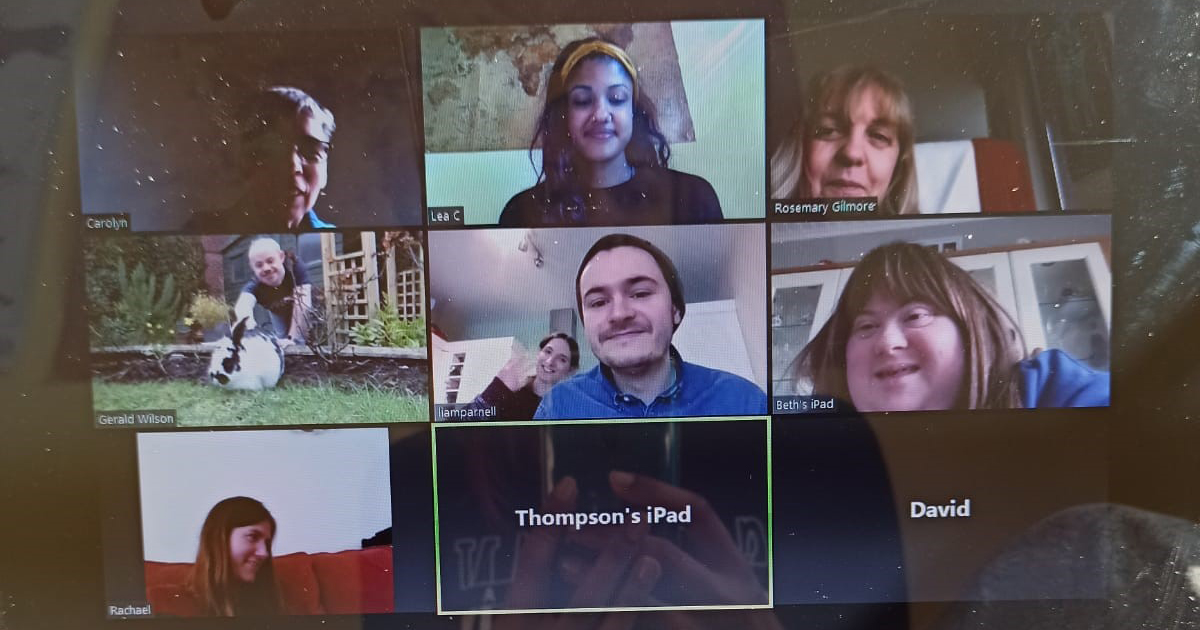Tiō Associates is a small charity based in Northern Ireland. Their vision is to see people with intellectual disabilities and their families being welcomed, valued and participating in the church and in society by promoting an authentic Christian perspective on intellectual disability. The charity does this by speaking, teaching, training and consultancy, celebrating and supporting best practice.
Early in lockdown we supplied Tiō Associates with some NIrV Accessible Edition: New Testaments to distribute to those who would benefit from them and we were keen to find out how they were used, so we had a chat with Rachael Mackarel.
Biblica: Rachael, what is your role and how did you get involved?
Rachael: I studied a Masters of Theology under our founding director Ian Dickson on the topic of Biblical Pedagogy* for people with intellectual disabilities. We piloted theological education for people with intellectual disabilities at Belfast Bible College in 2012 and completed 8 terms with our students.
Subsequently I have been leading Tiō’s Accessible Bible study group for adults with mild and moderate intellectual disabilities. Our members have successfully taken part in leading church services and speaking at events including New Horizon as well as our own Tiō Associates conferences.
Biblica: Tell us how your group has been using the Accessible New Testaments
Rachael: Our group have been using the New Testaments since they were published and we always promote and model the use of them at all Tiō training, services and events especially those which are intentionally accessible for people with disabilities.
We often take our time over passages to learn, process and begin to apply the text into our own lives. Each term we have a theme or section of New Testament text to cover, for instance one theme was ‘Friends of Jesus’. We read and used drama, arts and activities to learn about the people Jesus was friends with and how he related to them. We were able to bring out applications to help us all build positive relationships and be a good friend. These topics we addressed pastorally through share and prayer time and peer support e.g.; those of us that struggle with conflict were able to learn from the patience and assertiveness of Christ; Those of us who feel lonely and friendless were comforted by His friendship with us.
Before lockdown started, we ceased meeting in person with our group to safeguard and protect the well-being of our volunteers and members. We moved to online video conferencing and increased our frequency of meeting from fortnightly to weekly because so many other aspects of our members’ lives and routines were closing down, and we were keen to be a support to them. More of our members were able to read from their own Bibles at home because the weight and size of them made them difficult to transport for some when we were physically meeting up. We focused on memory verses of hope through the Spring and Summer e.g., Romans 15:13 and we learnt the Makaton signs online together to help us to learn it. We used this verse to springboard into praying for each other especially those with mental health struggles related to lockdown.
One of our members was sadly bereaved during the time that we were meeting online. We were unable to visit his family or support them at the funeral due to restrictions. Sometimes the topic of death and loss can be a bit taboo in the intellectual disabilities community because we do not want to upset people. Like others, for people with intellectual disabilities being a witness to a friend’s grief can stir up feelings of loss they have also experienced.
The week of the funeral we all gathered online and wore black together as a sign of our collective mourning. Then we read from our NIrV:
Give praise to the God and Father of our Lord Jesus Christ! He is the Father who gives tender love. All comfort comes from him. He comforts us in all our troubles. Now we can comfort others when they are in trouble. We ourselves receive comfort from God. 2 Corinthians 1:3-4 (NIrV)
The group members were given time to think about a time that they were sad and needed God’s comfort and then we prayed for God’s comfort to be known to our friend and his family. This verse helped us to process our own sadness and at the same time think about the feelings of our friend.
Biblica: Is there something that has encourage you during lockdown?
Rachael: Many adults with intellectual disability do not own their own Bible. Some live in supported living where staff do not share their faith or are not aware of different types of Bibles. To be able to put the NIrV in the hands of people in these situations has been wonderful. The simpler translation helps us to teach the meaning of texts without having to regularly stop and explain difficult words. Before lockdown we would meet in a church building and do our Bible study in a separate space from the rest of their lives. Now we are meeting online from our homes and the process of opening our Bibles and reading together is actually being shared with carers and staff, and so we are connecting with some of them in ways that we didn’t before.
*Pedagogy is the discipline of study related to the field of education and teaching methods

